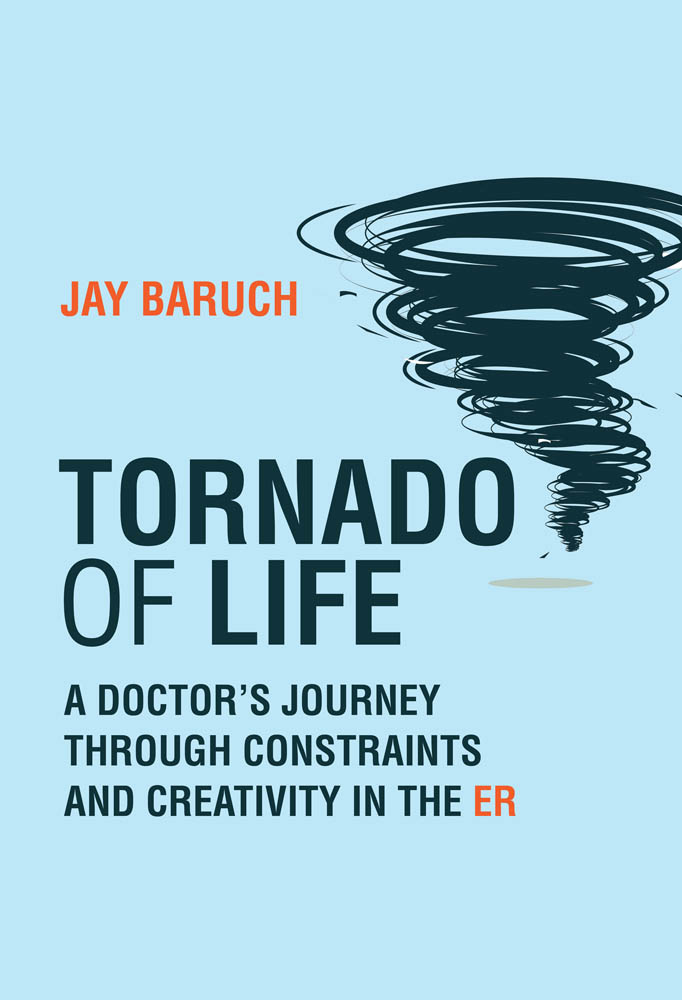"Through stories that are often tender, sometimes chaotic, and always revealing, Jay Baruch beautifully conveys the messy art of doctoring. Read Tornado of Life to understand the emergency room in all its glory—warts and all."
—Sandeep Jauhar, author of Intern: A Doctor's Initiation
"A book that, with huge empathy and compassion, builds a bridge between doctor and patient, writer and reader. Engaging and thoughtful."
— Sinéad Gleeson, author of Constellations
Get a copy for yourself or a friend
Excerpts in Salon, Lithub, KevinMD, The Harvard Gazette. Some words: Slate, MIT Press Reader, Zocalo Public Square, Next Big Idea Club. Some talk: Clear + Vivid podcast with Alan Alda, The Nocturnist, Design Lab, Visible Voices
“In this collection of brief, touching essays, an emergency room doctor presents poignant stories about disease and loneliness and argues that medical professionals are “stewards” of their patients’ stories, morally obligated to look beyond data and tests.”
—New York Times Book Review
“A rich collection...Baruch’s point is not simply to reaffirm what many doctor-writers and medical humanities programs have now made clear—that story making is an essential part of clinical medicine. His point is that story making is also a morally, spiritually, and medically relevant part of clinical responsibility. It is a precarious business, riddled with pitfalls, that needs to be approached with attentiveness and skill...With admirable humility, Baruch avoids pontificating about what his professional colleagues should do. Instead he reflects openheartedly on what he has learned from patients, from his own mistakes, and from surprising epiphanies that come from the way a patient worded a question." The Christian Century Review
“[An] unflinching essay collection…Baruch has a knack for narrative and writes in a refined prose, and many entries, such as two concerning domestic violence victims who won’t say that they’re in danger, are tough to forget. Fans of Thomas Fisher’s The Emergency: A Year of Healing and Heartbreak in a Chicago ER should give this a look.”—Publishers Weekly
"Uplifting to read…Shows how empathy, creativity and imagination can still be found in acute clinical care…Offers a series of short, powerful and affecting essays that capture the stories of ER patients in all their complexity. The book brings the reader right into the chaos…[Baruch’s] book is a testament to the need for patient stories to be listened to more than ever in our badly overcrowded emergency departments.”—Irish Times
[Baruch] has mastered a particular literary form that begins with a clinical scene and then steps back, taking a broader perspective. The trick of his writing is that when he turns to the institutional realities that make the local scene what it is, he manages not to lose the particularities of the people whom he has made vividly present.”—Hastings Center Report
“This book…stands out among the field of books written by physicians…featuring brevity that encapsulates what life is like in the emergency department—blunt, full of life, and unknowns…What sets this book apart from the many others that seek to give insight and glimpses into the clinical world of emergency medicine is the dedication to incorporate philosophy, literature, science, art, and the study of narrative medicine…Richly layered with clinical references, patient stories, narrative medicine, and concepts from various scientific fields and the arts…An excellent read for any clinician at any point in their career.”—Annals of Emergency Medicine
"Among the vast literature of doctors writing about their profession, Dr. Jay Baruch is a unique talent, a spellbinding storyteller and an expert and experienced diagnostician. With literary references and poetic flare, Tornado of Life reveals the whirlwind of emotions gusting through emergency rooms. Rarely does a physician admit his own vulnerabilities and uncertainties in a way that illuminates the true art of his healing."
—Randi Hutter Epstein, Writer in Residence Yale School of Medicine, and author of Aroused: The History of Hormones and How They Control Just About Everything
“An homage to the people Baruch has treated, failed, and helped. His ability to tell a story is what makes it so compelling. Tender, thoughtful and, at times, hard to read, it focuses on a doctor doing his best to truly hear patients, while constantly questioning whether his efforts are enough…Beautifully written with a different take on life.”—Library Journal
“Wow! This is THE BEST medical autoethnography/ memoir that I have read, no question. It is so inspiring…thank you for your book - a rare gem! --Alan Bleakley, PhD. Emeritus Professor of Medical Education and Medical Humanities, Plymouth Peninsula School of Medicine, University of Plymouth UK
